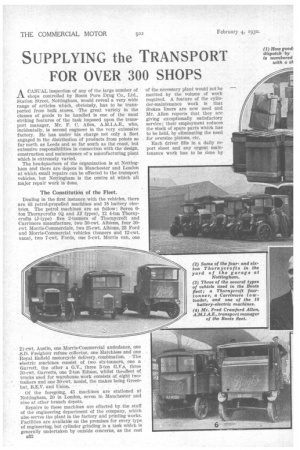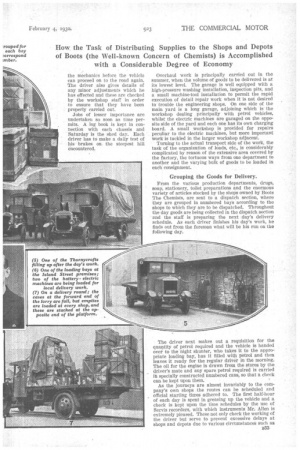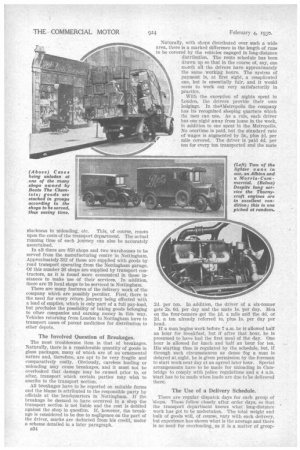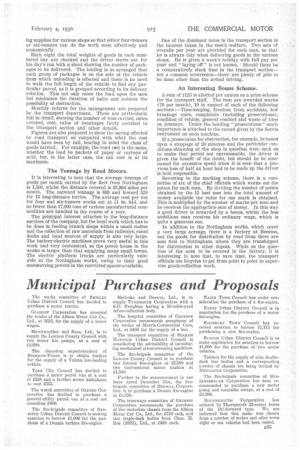SUPPLYING the TRANSPORT FOR OVER 300 SHOPS
Page 58

Page 59

Page 60

Page 61

If you've noticed an error in this article please click here to report it so we can fix it.
How the Task of Distributing Supplies to the Shops and Depots of Boots (the Well-known Concern of Chemists) is Accomplished with a Considerable Degree of Economy
ACASUAL inspection of any of the large number of shops controlled by Boots Pure Drug Co., Ltd., Station Street, Nottingham, would reveal a very wide range of articles which, obviously, has to be transported from bulk . stores. The great variety in the classes of goods to be handled is one of the most striking features of the task imposed upon the transport manager, Mr. F. C. Allen, A.M.I.A.E., who, Incidentally, is second engineer in the very extensive factory. He has under his charge not only a fleet engaged in the distribution of products from points so far north as Leeds and so far south as the coast, but extensive responsibilities in connection with the design, construction and maintenance of a manufacturing plant which is extremely varied.
The headquarters of the organization is at Nottingham and there are depots in Manchester and London at which small repairs can be effected to the transport vehicles, but Nottingham is the centre at which all major repair work is done.
The Constitution of the Fleet.
Dealing in the first instance with the vehicles, there are 63 petrol-propelled machines and 18 battery electries. The petrol machines are as follow: Seven 6ton Thornycrofts (Q and J,1" types), 12 4-ton Thornycrofts (J-type) five 2-tonners of Thornycroft and Carrimore manufacture, two 30-cwt. Albions, four 30cwt. Morris-Commercials, two 25-cwt. Albions, 23 Ford and Morris-Commercial vehicles (tonners and 12-cwt. vans), two 7-cwt. Fords, one 5-cwt. Morris van, one
2l-cwt. Austin, one Morris-Commercial ambulance, one . S.D. Freighter refuse collector,one Matchless and one Royal Enfield motorcycle delivery. combination. The electric machines consist of two six-tonners, one a • Garrett, the other a G.V., three 3-ton G.V.s, three 30-cwt. Garretts, one 2-ton Edison, whilst thealeet of trucks used for warehouse work consists of. eight twotonhers and one 30-cwt model, the makes being Green bat, B.E.V. and Union. "
. Of the foregoing, 45 machines are stationed at Nottingham, 20 in London, seven in Manchester and nine at other branch depots.
Repairs to these machines are effected by. the staff of the engineering department of the company, which also serves the plant in the factory and printing works. Facilities are available on the premises for every type of engineering, but cylinder grinding is a task which is generally undertaken by outside Oilcans, as the cost n32 of the necessary plant would not be merited by the volume of work required. A feature of the cylinder-maintenance work is that Stokes liners are now used and Mr. Allen reports that they are giving exceptionally satisfactory service; their employment reduces the stock of spare parts which has to be held, by eliminating the need for oversize pistons, etc.
Each driver fills in a daily report sheet and any urgent maintenance work has to be done by the mechanics before the vehicle can proceed on to the road again. The driver also gives details of any, minor adjustments which he has effected and these are checked by the workshop staff in order to ensure that they have been properly carried out.
Jobs of lesser importance are undertaken so soon as time perruits. A log book is kept in connection with each chassis and Saturday is the shed day. Each driver has to make a daily test of his brakes on the steepest hill encountered. Overhaul work is principally carried out in the summer, when the volume of goods to be delivered is at its lowest level. The garage is well equipped with a high-pressure washing installation, inspection pits, and a small machine-tool installation to permit the rapid execution of detail repair work when it is not desired to• trouble the engineering shops. On one side of the main yard is a long garage, adjoining which is the workshop dealing . principally with petrol vehicles, whilst the electric machines are garaged on the opposite side of the yard and each one has its own charging board. A small workshop is provided for repairs peculiar to the electric machines, but more important work is tackled in the larger workshop adjacent.
Turning to the actual transport side of the work, the task of the organization of loads, etc., is considerably complicated by reason of the extensive area covered by the factory, the tortuous ways from one department to another and the varying bulk of goods to be loaded in each consignment.
• Grouping the Goods for Delivery.
From the various production departments, drugs, soap, stationery, toilet preparations and the enormous variety of articles stocked by the shops owned by Boots The Chemists, are sent to a dispatch section, where they are grouped in numbered bays according to the shops to which they are to be dispatched. Throughout the day goods are being collected in the dispatch section and the staff is preparing the next day's delivery schedule. As each driver finishes his day's work, he finds out from the foreman what will be his run on the following day.
The driver next makes out a requisition for the quantity of petrol required and the vehicle is handed over' to the night shunter, who takes it to the appropriate loading bay, has it filled with petrol and then leaves it ready for the regular driver in the morning. The oil for the engine is drawn from the stores by the driver's mate and any spare petrol required is carried in specially constructed numbered cans, so that a check can be kept upon them. As the journeys are almost invariably to the company's own shops the routes can be scheduled and official starting times adhered to. The first half-hour of each day is spent in greasing up the vehicle and a check is kept upon the time schedules by the use of Servis recorders, with whieh instruments Mr. Allen is extremely pleased. These not only check the working of the driver but serve to prevent excessive delays at shops and depots due to various circumstances such as Flacknef:s in unloading, etc. This, of course, reaots
upon the costs of the transport department. The actual running time of each journey can also be accurately ascertained.
In all there are 850 shops and two warehouses to be served from the manufacturing centre in Nottingham. Approximately 312 of these are supplied with goods by road transport operating from the Nottingham garage. Of this number 36 shops are supplied by transport contractors, as it is found more economical in those instances to make use of their services. In addition, there are 18 local shops to be serviced in Nottingham.
There are many features of the delivery work of the company which are possibly peculiar. First, there is the need for every return journey being effected with a load of empties, which is only part of a full pay-load, but precludes the possibility of taking goods belonging to other companies and earning money in this way. Vehicles returning from London to Nottingham have to transport cases of patent medicines for distribution to other depots.
The Involved Question of Breakages.
The most troublesome item is that of breakages. Naturally, there is a considerable quantity of goods in glass packages, many of which are of an 'ornamental nature and, therefore, are apt to be very fragile and comparatively costly. Obviously, careless loading or unloading may cause breakages, and it must not be overlooked that damage may be caused prior to, or after, transport which certain parties may wish to asteribe to the transport section.
All breakages have to be reported on suitable forms and the blame is attributed to the responsible party by officials at the headquarters in Nottingham. If the breakage be deemed to have occurred in a shop the transport section is not liable and the cost is debited against the shop in question, if, however, the breakage is considered to be due to negligence on the part of the driver, marks are deducted from his credit, under a scheme detailed in a later paragraph. • B34 Naturally, with shops distributed over such a wide area,,there is a marked difference in the length of runs to be covered by the vehicles engaged in long-distance distribution. The route schedule has been drawn up so that in the course of, say, one month all the drivers have approximately the same working hours. The system of payment is, at first sight, a complicated one, but is essentially fair, and it would seem to work out very satisfactorily in practice.
With the exception of nights spent in London, the drivers provide their own lodgings. In the' Metropolis the company has its recognized sleeping quarters which thE men can use. As a rule, each driver has one night away from home in the week, in addition to one spent in the Metropolis. No overtime is paid, but the standard rate of wages is augmented by 5s., plus Id. per mile covered. The driver is paid 4d. per ton for every ton transported and the mate
2d. per ton. In addition, the driver of a six-tonner gets .2s. 6d. per day and the mate is. per day. Men on the four-tonners get the id. a mile and the 4d. or 2d. a ton already referred to, plus is. per day per head.
If a man begins work before 7 a.m. he is allowed half an hour for breakfast, but if after that hour, he is presumed to have had the first meal of the day. One hour is allowed for lunch and half an hour for tea. His starting time is regulated by the schedule, but, if through such circumstances as dense fog a man is delayed at night, he is given permission by the foreman to start work next day at an agreed later hour. Special arrangements have to be made for unloading in Cambridge to comply with police regulations and a 4 a.m. start has to be made when loads are due tole delivered there.
The Use of a Delivery Schedule.
There are regular dispatch days for each group of "shops. These follow closely after order days, so that the transport department knows what long-distance work has got to be undertaken. The total weight and bulk of goods will, of course, vary with each delivery, but experience has shown what is the average and there is no need for overloading, as it is a matter of group ing supplies for various shops so that either four-tonnera or six-tonners can do the work most effectively and economically.
Each night the total weights of goods in each numbered bay are checked and the driVer starts out for • his day's run With a sheet showing the number of packages to be delivered. The loading is so arranged that each group of packages is on the side of the vehicle from which unloading is effected and there is no need to walk the full length of the vehicle to find any Particular parcel, as it is grouped according to its delivery rotation. This not only eases the load upon the men but minimizes the duration of halts and reduces the possibility of obstruction.
Monthly returns for the management are prepared by the transport department. These are particularly full in detail, showing the number of tons carried, miles covered, cost, value of breakages fairly ascribed to the transport section and other details.
Figures are also prepared to show the saving effected by road transport as compared with what the cost would have been by rail, bearing in mind the class of goods a.rried. For exaniple, the road cast is the same, whether the load be packets of paper or carboys of acid, but, in the latter case, the rail cost is at its maximum.
The Tonnage by Road Motors.
It is interesting to note that the average tonnage of goods per month carried by the fleet from Nottingham is 1,500, whilst the distance covered is 35,994 miles per month. The outward tonnage is 893 and inward 520 for 13 long-distance lorries. The average cost per ton for four and six-tanners works out at £1 8s. 61d. and no fewer than 17,000 tons of various manufactured commodities are handled in the course of a year.
The principal interest attaches to the long-distance services of the company, but the local work which has to be done in feeding branch shops within a small radius and the collection of raw materials from railways, canal docks and local sources of supply is also very large. The battery-electric machines prove very useful in this work and very economical, as the power house in the works is larger than that supplying many small towns. The electric platform trucks are particularly valuable at the Nottingham works, owing to their good manceuvring powerS in the restricted spaces available. One of the dominant notes in the transport section is the interest taken in the men's welfare. Two sets of overalls per year are provided for each man, so that be is always tidy when delivering goods in the various shops. He is given a week's holiday with full pay per, year and "laying: off" is not known. Should there be a comparatively slack time in the transport section— not a common occurrence—there are plenty of jobs to be done other than the actual driving.
An Interesting Bonus Scheme.
A sum of £125 is allotted per annum as a prize scheme for the transport staff. The men are awarded marks (70 per month), 10 in respect of each of the fbllowing sections :—Time-keeping, freedom from accidents, low breakage costs, complaints (including prosecutions), condition of vehicle, general conduct and waste of time on journeys. Under the heading " prosecutions " much importance is attached to the record given by the Servis instrument on each naachine.
If a prosecution for obstruction, for example, be based upon a stoppage of 20 minutes and the particular conditions obtaining at the shop in question were such as to make that period not unreasonable, the driver is given the benefit of the doubt, but should he be summoned for excessive speed when it is seen that a previous loss of half an hour had to be made up the driver is held responsible.
Reverting to the marking scheme, there is a committee of six of the chief officials which works out the points for each man. By dividing the number of points obtained by the 15 best men into the total amount of money available the value for one mark is obtained. This is multiplied by the number of marks per man and he receives the appropriate sum of money. In this way a good driver is rewarded by a bonus, whilst the less ambitious man receives his ordinary wage, which is quite a generous one.
in addition to the Nottingham works, which cover a very large acreage, there is a factory at Beeston, but the goods for• distribution by road from there are sent first to Nottingham, where they are transhipped for distribution to other depots. While on the question of the area to be covered in the factory, it is Interesting to note that, to save time, the transport officials use bicycles to get from point to point to supervise goods-collection work.




















































































































